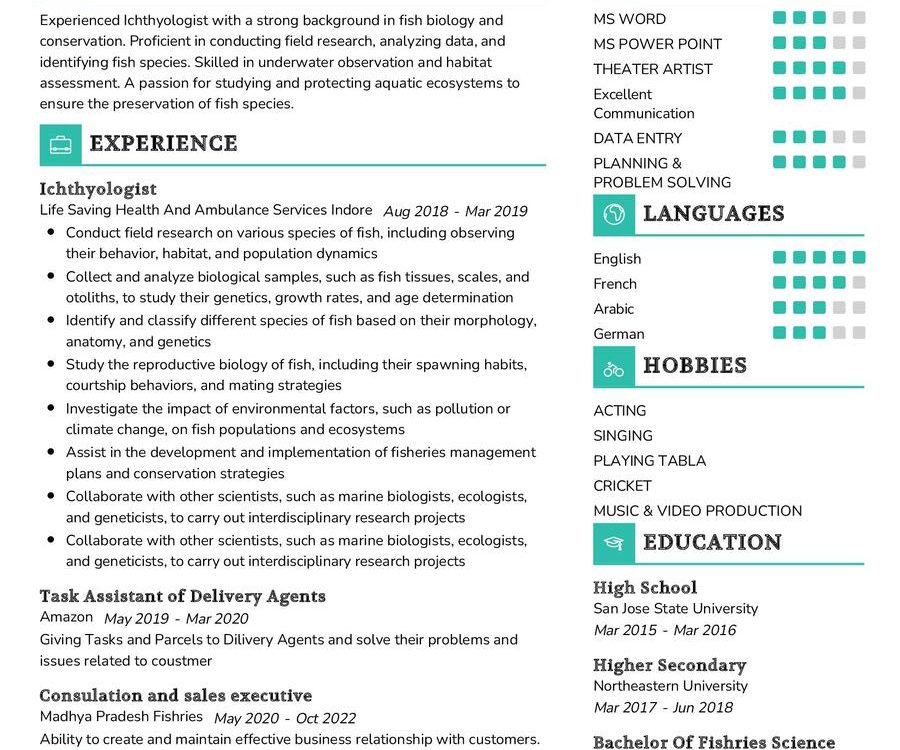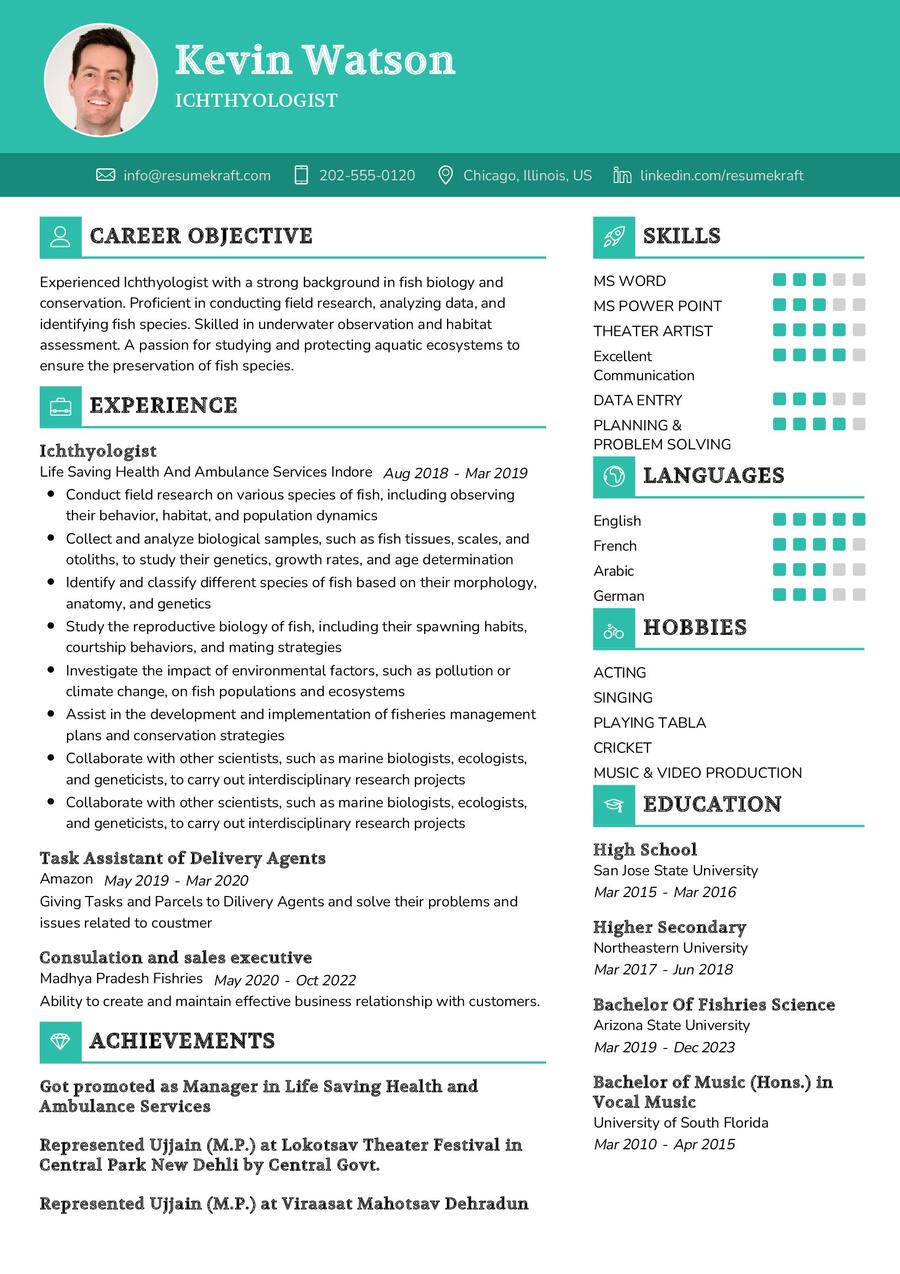Exploring the Role of an Ichthyologist
As the world’s aquatic ecosystems continue to capture our fascination, the role of an Ichthyologist emerges as a crucial link between scientific exploration and conservation efforts. This article delves into the multifaceted responsibilities of an Ichthyologist, exploring the educational journey, skills, and experiences that make an individual adept in the study of fish species.
Ichthyologist Job Requirements
Embarking on a career as an Ichthyologist demands a unique set of qualifications and skills. Let’s break down the key requirements necessary to dive into this fascinating field:
- A Bachelor’s or Master’s degree in Biology, Zoology, or a related field, providing a strong foundation in the biological sciences.
- Profound knowledge of fish anatomy, behavior, and ecosystems, gained through academic studies and practical fieldwork.
- Hands-on experience in fish specimen collection, preservation, and analysis, showcasing a practical understanding of ichthyological methodologies.
- Research skills, including the ability to design and conduct experiments, analyze data, and draw meaningful conclusions.
- Effective communication skills, crucial for presenting research findings, collaborating with colleagues, and educating the public.
- Attention to detail and patience, essential qualities when working with delicate specimens and conducting precise scientific observations.
- Adaptability to various environments, as fieldwork may involve traveling to different aquatic habitats and ecosystems.
Acquiring additional certifications in specialized ichthyological techniques or related fields can enhance your profile in the competitive job market.
Responsibilities of an Ichthyologist
The role of an Ichthyologist is a rich tapestry of scientific exploration, conservation efforts, and knowledge dissemination. Let’s unravel the core responsibilities that define this unique role:
- Conducting field surveys and expeditions to study fish populations, behavior, and habitats.
- Collecting, preserving, and cataloging fish specimens for research and reference purposes.
- Collaborating with environmental agencies to assess the impact of human activities on aquatic ecosystems and fish populations.
- Analyzing data using various scientific techniques and tools, contributing to the understanding of fish biology and ecology.
- Engaging in public outreach and education programs to raise awareness about fish conservation and environmental sustainability.
- Contributing to scientific publications, presenting research findings at conferences, and participating in collaborative research projects.
- Adhering to ethical and legal standards in the collection and study of fish specimens, ensuring responsible and sustainable practices.
Each responsibility in the field of ichthyology is a step towards a deeper understanding of aquatic ecosystems and the preservation of biodiversity.
Ichthyologist CV Writing Tips
Crafting a compelling CV is essential for standing out in the competitive field of ichthyology. Here are some tips to help you create a CV that showcases your expertise and passion for the study of fish:
- Highlight your fieldwork experience, emphasizing the diversity of aquatic environments you’ve explored and studied.
- Detail specific research projects, outlining your contributions and the impact of your findings on the field of ichthyology.
- Include any publications, presentations, or collaborative research efforts that demonstrate your commitment to advancing ichthyological knowledge.
- List relevant certifications and training programs, showcasing your continuous learning and professional development in the field.
- Customize your CV for each application, tailoring it to emphasize the aspects of your experience that align with the specific job requirements.
Your CV is a reflection of your journey in ichthyology, so make sure it tells a compelling story of your contributions to the field.
Ichthyologist CV Summary Examples
Your CV summary serves as a snapshot of your ichthyological journey, encapsulating your experiences, skills, and the value you bring to the scientific community. Here are some examples to inspire you:
- “Passionate Ichthyologist with a Master’s in Zoology and a decade of field experience, dedicated to unraveling the mysteries of aquatic ecosystems and contributing to fish conservation efforts.”
- “Experienced Ichthyologist specializing in the study of freshwater fish populations, adept at combining fieldwork and laboratory research to enhance our understanding of aquatic biodiversity.”
- “Detail-oriented Ichthyologist with expertise in marine fish behavior, committed to promoting sustainable practices and educating the public about the importance of preserving our oceans.”
Your CV summary is your opportunity to make a lasting impression, so ensure it reflects your passion and expertise in ichthyology.
Create a Strong Experience Section for Your Ichthyologist CV
Your experience section is the heart of your CV, detailing the significant milestones and contributions you’ve made in the field of ichthyology. Here are some examples to guide you:
- “Led a team of researchers in a comprehensive study of coral reef fish populations, resulting in the discovery of a new species and contributing valuable data to marine conservation efforts.”
- “Developed and implemented a community-based fish monitoring program, engaging local residents in the conservation of freshwater ecosystems and fostering a sense of environmental responsibility.”
- “Published a series of research papers on the impact of climate change on fish behavior, providing critical insights for policymakers and environmental organizations.”
Each experience in your CV is a chapter in your ichthyological journey, showcasing your dedication to scientific exploration and conservation.
Sample Education Section for Your Ichthyologist CV
Your educational background is the foundation of your expertise in ichthyology. Here’s how you can list your academic achievements:
- Doctor of Philosophy in Biology, XYZ University, an in-depth exploration of advanced ichthyological research, 2015.
- Master of Science in Zoology, ABC University, a comprehensive study of fish anatomy, behavior, and ecosystems, 2012.
- Bachelor of Science in Biology, DEF College, the starting point of your journey into the biological sciences, 2009.
Each academic qualification is a stepping stone, contributing to your knowledge and expertise as an Ichthyologist.
Ichthyologist Skills for Your CV
Your skill set is your toolkit, equipped with a diverse range of abilities you’ve honed over the years. Here are the essential skills that make a successful Ichthyologist:
Soft Skills:
- Passion for aquatic ecosystems, the driving force behind your dedication to ichthyology.
- Effective communication, the ability to convey complex scientific concepts to diverse audiences.
- Attention to detail, crucial for accurate specimen collection, analysis, and research.
- Adaptability, the capability to thrive in various environments, from freshwater rivers to deep-sea habitats.
- Patience, a key quality when conducting prolonged field surveys and meticulous laboratory work.
Hard Skills:
- Expertise in fish anatomy and behavior, the foundation of your ichthyological knowledge.
- Research and data analysis, skills essential for contributing to the scientific understanding of fish populations.
- Fieldwork proficiency, including the ability to use specialized equipment for specimen collection and environmental monitoring.
- Species identification, a skill developed through years of studying and cataloging various fish species.
- Environmental impact assessment, knowledge necessary for evaluating the effects of human activities on aquatic ecosystems.
Each skill is a tool, contributing to your success as an Ichthyologist in the scientific community.
Common Mistakes to Avoid When Writing an Ichthyologist CV
Avoiding common pitfalls is crucial when crafting your Ichthyologist CV. Here are the mistakes to steer clear of:
- Using generic language, a pitfall that fails to capture the uniqueness of your ichthyological journey.
- Focusing solely on academic achievements, overlooking the practical fieldwork and research contributions that set you apart.
- Neglecting to tailor your CV for specific job applications, missing the opportunity to highlight relevant experiences and skills.
- Omitting details about your role in collaborative research projects, a mistake that understates the breadth of your scientific contributions.
- Overloading your CV with technical jargon, potentially alienating non-expert readers who may be involved in the hiring process.
Avoiding these mistakes ensures your Ichthyologist CV is a true representation of your expertise and potential in the field.
Key Takeaways for Your Ichthyologist CV
As you conclude this comprehensive guide to crafting an impactful Ichthyologist CV, keep these key points in mind:
- Emphasize your fieldwork experiences, showcasing the diversity of aquatic environments you’ve explored.
- Highlight your contributions to research, publications, and collaborative projects that advance ichthyological knowledge.
- Customize your CV for each application, emphasizing the aspects of your experience that align with the specific job requirements.
- Include a section on continuous learning, showcasing certifications and training programs that demonstrate your commitment to professional development.
Finally, feel free to utilize resources like AI CV Builder, CV Design, CV Samples, CV Examples, CV Skills, CV Help, CV Synonyms, and Job Responsibilities to create a standout application and prepare for the Ichthyologist job interview.
Armed with these insights and tips, you are now ready to craft a CV that is a true reflection of your journey, your skills, and your passion for ichthyology. Remember, your CV is not just a document; it is a canvas where you paint your career story, a story of exploration, discovery, and dedication to the study of aquatic life. Best of luck!


